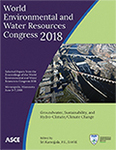World Environmental and Water Resources Congress 2018
A Watershed Scale Life Cycle Assessment Framework for Stormwater Management
Publication: World Environmental and Water Resources Congress 2018: Groundwater, Sustainability, and Hydro-Climate/Climate Change
ABSTRACT
Designing sustainable urban water infrastructure requires consideration of hydrologic and hydraulic performance (H&H) and the life cycle assessment (LCA). Although LCA (ISO 14044) has been widely used for the sustainability assessment of a variety of infrastructure and products, its application in water resources is limited. The objective of this paper is to present a method of integrating H&H and LCA criteria into the evaluation of the environmental sustainability of urban water infrastructure. This method serves as a decision support system for analyzing stormwater control infrastructure. Rainwater harvesting (RWH), a trending decentralized urban water infrastructure, showcases the application of the proposed method in this paper. Results show that without using an integrated method, life cycle impacts are noticeably underestimated. The integrated method provided broader information on stormwater control strategies, and indicated the strengths and weaknesses of each scenario.
Get full access to this chapter
View all available purchase options and get full access to this chapter.
ACKNOWLEDGMENT
This paper presents a part of a research for the urban Water Infrastructures Sustainability Evaluation (uWISE) project funded by the U.S. National Science Foundation (NSF) through grants CBET-1235855 and 1236660.
REFERENCES
City of Toledo. (2005). “Flow characterization study report” Toledo Waterways Initiative, Toledo, OH.
City of Toledo. (2009). “Combined sewer overflow long term control plan report” Toledo Waterways Initiative, Toledo, OH.
Comas, J. and Morera, S. (2012). “Life cycle assessment and water management-related issues” Documenta Universitaria, ISBN: 8499841651, 9788499841656
De Sousa M. R. C., Montalto, F. A., Spatari, S. (2012). “Using life cycle assessment to evaluate green and grey combined sewer overflow control strategies” J. Ind. Ecol. 16 (6): 901–913
Fewkes, A. and Butler, D. (2000). “Simulating the performance of rainwater collection and reuse systems using behavioral models” Build. Serv. Eng. Res. Technol. 21(2) 99–106.
Ghimire, S. R., Johnston, J. M., Ingwersen, W. W., and Hawkins, T. R. (2014). “Life cycle assessment of domestic and agricultural rainwater harvesting systems” Environ. Sci. Technol. American Chemical Society, Washington, DC, 48(7), 4069–4077.
Ghimire, S. R., Johnston, J. M. (2015) “Impacts of domestic and agricultural rainwater harvesting systems on watershed hydrology: A case study in the Albemarle-Pamlico river basins (USA)” Ecohydrology & Hydrobiology, Volume 13, Issue 2, 2013, Pages 159–171
ISO (International Organization for Standardization). (2006). “ISO 14044. Environmental management — Life cycle assessment — Requirements and guidelines”. Geneva, Switzerland: ISO.
Montalto, F. and Rothstein, E. (2008). “Decentralized urban water infrastructure” The Quarterly Newsletter of the Architects League of Northern New Jersey, Leagueline 1Q
Morales-Pinzon, T., Luruena, R., Rieradevall, J., Gasol, C. M., Gabarrell, X., (2012). “Financial feasibility and environmental analysis of potential rainwater harvesting systems: a case study in Spain” Resour. Conserv. Recycl. 69, 130–140.
PE International. (2014). Gabi database. http://www.pe-international.com.
Rossman, L. (2015) “Storm water management model user’s manual: Volume I – Hydrology” U.S. Environmental Protection Agency, Cincinnati, OH.
Steffen, J., Jensen, M., Pomeroy, C. A., Burian, S. J. (2013). “Water supply and stormwater management benefits of residential rainwater harvesting in U.S. cities.” J. Am. Water Resour. Assoc., 49(4), 810–824.
Tavakol-Davani, H., Burian, S. J., Devkota, J., Apul, D. (2015). “Performance and cost based comparison of green and gray infrastructure to control combined sewer overflows” Journal of Sustainable Water in the Built Environment. Online Publication Date: 27 Oct 2015.
Tavakol-Davani, H. (2016) “Watershed-scale life cycle assessment of rainwater harvesting systems to control combined sewer overflows”, PhD Dissertation, University of Utah, https://search.proquest.com/docview/1839262761
Tavakol-Davani, H., Goharian, E., Hansen, C., Tavakol-Davani, H., Apul, S., Burian, S. J. (2016) “How does climate change affect combined sewer overflow in a system benefiting from rainwater harvesting systems?” Journal of Sustainable Cities and Society, ISSN, https://doi.org/10.1016/j.scs.2016.07.003
Uche, J., Martinez-Gracia, A., Cirez, F., Carmona, U., (2015). “Environmental impact of water supply and water use in a Mediterranean water stressed region”, J. Clean. Prod., Volume 88, Pages 196–204, ISSN, https://doi.org/10.1016/j.jclepro.2014.04.076.
U.S. EPA. (2014). “Greening CSO plans: Planning and modeling green infrastructure for combined sewer overflow (CSO) control.” EPA-832-R-14–001, Washington, DC.
Vargas-Parra, M. V., Villalba, G., Gabarrell, X. (2013). “Applying exergy analysis to rainwater harvesting systems to assess resource efficiency”. Resour. Conserv. Recycl. 72, 50–59.
Wang, R., Eckelman, M. J., Zimmerman, J. B. (2013). “Consequential environmental and economic life cycle assessment of green and gray stormwater infrastructures for combined sewer systems” Environ. Sci. Technol. 47: 11189–11198
Ward, S., Butler, D, Memon, F. A. (2010). “Rainwater Harvesting: model-based design evaluation.” Water Science and Technology, 61, 1, 85–96.
Recycl. Volume 65, August 2012, Pages 136–144
Zahmatkesh, Z., Burian, S. J., Karamouz, M. Tavakol-Davani, H., Goharian, E. (2014). “Low-impact development practices to mitigate climate change effects on urban stormwater runoff: case study of New York City” J. Irrig. Drain Eng.
Information & Authors
Information
Published In
World Environmental and Water Resources Congress 2018: Groundwater, Sustainability, and Hydro-Climate/Climate Change
Pages: 294 - 303
Editor: Sri Kamojjala, Las Vegas Valley Water District
ISBN (Online): 978-0-7844-8141-7
Copyright
© 2018 American Society of Civil Engineers.
History
Published online: May 31, 2018
Authors
Metrics & Citations
Metrics
Citations
Download citation
If you have the appropriate software installed, you can download article citation data to the citation manager of your choice. Simply select your manager software from the list below and click Download.
